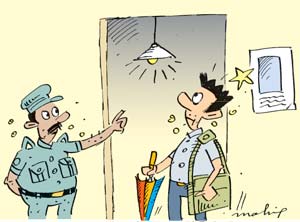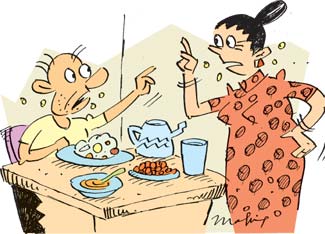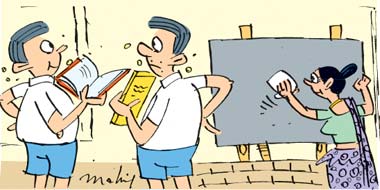|

by R. S. Karunaratne
Use of 'when'
in speech and writing
'When' is a question adverb, conjunction and a relative adverb.
1. We use 'when' to ask questions about the times of things.
When is lunch?
When will he come?
|

Switch off the lights when you leave. |
When will you be writing the essay?
When can we meet?
When are they coming from London?
2. We use 'when' to ask indirect questions.
Do you know when the train leaves?
I asked him when the next intake would take place.
I do not know when he comes.
We didn't know what to do when it rained.
You can answer when the phone rings.
3. We use 'when' to talk about the time for doing things.
He did not know when to play.
You should know when to talk to him.
The advertisement does not say when to apply.
You must know when to laugh.
Do you know when to remain silent?
4. We use 'when' to talk about future events.
When we cross the bridge they will receive us.
When you pass your examination you will get a job.
When the clock strikes nine the lecture will start.
When you have an ambition you will try to achieve it.
When prices go up they will never come down.
5. We use 'when' for routine work.
Switch off the lights when you leave.
Keep a watch on valuables when you travel.
Do not talk when you eat.
Do not spit on the road when you travel.
When in doubt leave it out.
Collocations
|

Do not talk when you eat. |
'When' often follows certain nouns.
Can you remember the day when you went to school for the first time?
This is one occasion when you have to wear a tie.
Christmas is a season when children rejoice.
What can the patients do in cases when doctors go on strike?
7. Set phrases
Since when have you had a headache? (How long)
Please come home when you like.
I usually do not wear a sari, but when in Rome... (when in Rome do as
Romans do.)
Activity
Put in 'when' in the following sentences and check your answers with
the key.
1. What happened she jumped into the pond?
2. Even he caught a few, they were very small ones.
3. The fish appeared he told it that he wished for a house.
4. They stopped for a rest a snake appeared.
5. Did he decide to take his sons with him?
6. Was the youngest son really foolish?
7. Did the trader want to go to another town?
8. Did the king call himself an emperor?
9. Did the two thieves buy rich clothes?
10. Did you go out?
*********
[Key]
1. What happened when she jumped into the pond?
2. Even when he caught a few, they were very small ones.
3. When the fish appeared he told it that he wished for a house.
4. When they stopped for a rest, a snake appeared.
5. When did he decide to take his sons with him?
6. When was the youngest son really foolish?7. When did the trader
want to go to another town?
8. When did the king call himself an emperor?
9. When did the two thieves buy rich clothes?
10. When did you go out?
*********
Current English usage
English is a living language and it is subject to changes from time
to time. Here's help for you to keep in touch with the latest trends in
the language.
1. Concave and convex
Concave means 'curved inwards' like the inside of a spoon. Convex
means 'curved outwards' as in the outside of a spoon.
2. Conducive
Conducive means 'contributing to'. It is always followed by the
preposition 'to'. The present condition of the country is conducive to
investment.
3. Confidant and
confident
Confidant is someone you trust.
The king had a few ministers who were his confidants.
Confident means 'having confidence'
Are you confident of success?
4. Conform
When conform is followed by the preposition 'to' it means 'to comply
with'
You have to conform to government regulations.
When conform is followed by the preposition 'with', it means 'to
agree with'
Your ideas do not conform with those of your colleagues.
5. Connection and
connexion
These are two different spellings of the same word meaning 'a
relationship between two events. However, connection is more popular
than connexion.
6. connoisseur
Note the spelling: double 'n', double 's' and 'oi' in between. It
means 'somebody who has a specialised knowledge of a subject'.
Raj was a connoisseur of ballet.
7. Conscientious
Note the 't' before 'ious'. It means diligent and careful'.
We need more conscientious public servants.
8. Connote and denote
Connote means 'to suggest something in addition to the meaning of a
word. For instance, 'mother' connotes 'love and kindness'.
Denote means 'to indicate'.
'Mother' denotes 'a woman who has given birth to a child'.
9. Consequent and
subsequent
Consequent means 'following as a direct result'.
Bob claimed damages for the accident and consequent injuries.
Subsequent means 'happening after'.
Hema's arrival and her subsequent early departure puzzle me.
10. contagious and
infectious
Contagious means 'passed on by physical contact.'
Most skin diseases are contagious.
Infectious means caused by airborne or waterborne microorganisms'.
The common cold is infectious.
Starters
Active and
Passive voice
A sentence that begins with a person or thing that does the action is
in the active voice. The sentence must have an active verb.
The dog bit the child.
|

The blackboard was cleaned by the teacher. |
The mechanic repaired the bus.
A sentence that begins with a person or thing that receives the
action is in the passive voice. The sentence must have a passive verb.
The child was bitten by the dog.
The bus was repaired by the mechanic.
Passive verbs are formed in the follwing way:
The verb 'to be' the past participle of the main verb.
The blackboard was cleaned by the teacher.
The robbers were arrested by the police.
In a sentence using the passive voice, the object comes after the
verb and the prepostion 'by'.
Buses are repaired by mechanics.
Some verbs have the same form for the past tense and the past
participle.
Present tense : catch
Past tense and past participle : caught
Other examples are:
teach - taught - taught
feed - fed - fed
hear - heard - heard
keep - kept - kept
sweep - swept - swept
sleep - slept - slept
buy - bought - bought
laugh - laughed - laughed
walk - walked - walked
creep - crept - crept
Some verbs have different forms for the past tense and the past
participle.
eat - ate - eaten
beat - beat - beaten
fly - flew - flown
take - took - taken
write - wrote - written
hide - hid - hidden
drive - drove - driven etc.
Activity
State whether the follwing sentences are right or wrong. Check your
answers with the key,
1. The doctor was examined by the patient.
2. My uncle smokes a pipe.
3. A herd of elephants was spotted by the cameraman.
4. Father is managed the factory.
5. The kitten bitten by the dog.
6. The pickpocket questioned the police.
7. We were served by an efficient waiter.
8. Flood victims want food.
9. She was poured the tea into cups.
10.Boys are attended by judo clubs.
***********
[Key]
1. Wrong 2. right 3. right 4. wrong 5. wrong 6. wrong 7. right 8.
right 9. wrong 10.wrong
*********** |

